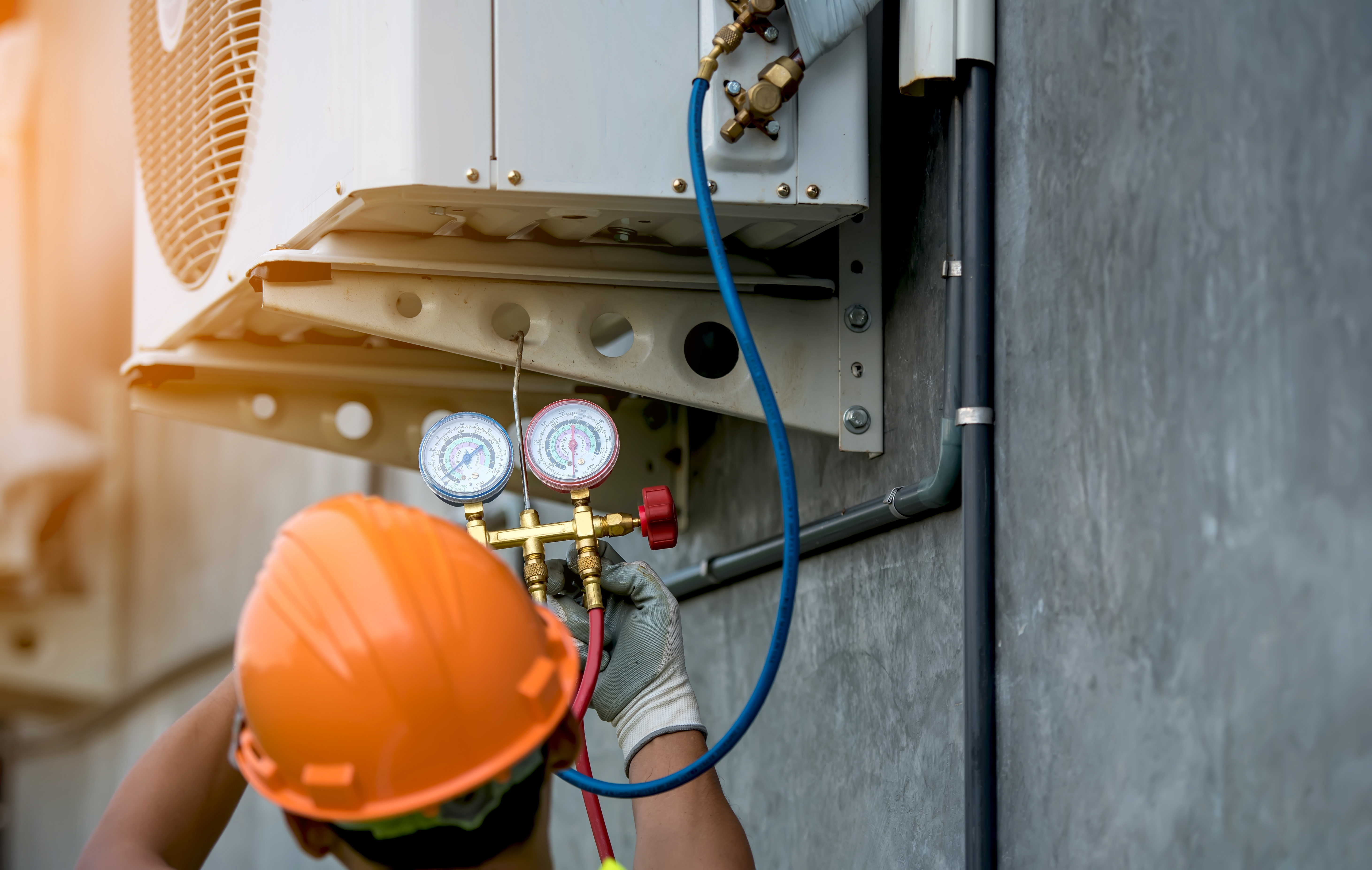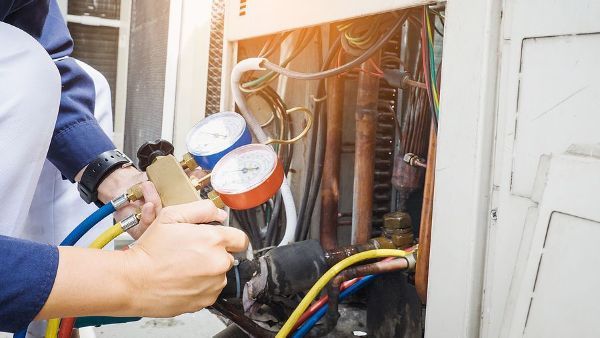HVAC company vs independent tech: which is better?
Everything about Cooling And Heating: Identifying Common Issues and Effective AC Repair Service Methods
Heating and cooling systems are crucial for preserving indoor convenience. Understanding their parts and functionality is essential for identifying usual concerns. Home owners frequently face problems such as inadequate cooling, unusual odors, or increasing energy expenses. These indicators can indicate underlying problems that may require attention. Discovering do it yourself troubleshooting techniques can be advantageous, but knowing when to look for specialist assistance is equally vital. What actions can be required to ensure durable performance?
Recognizing Your Heating And Cooling System: Components and Capability
A heating and cooling system, frequently thought about the backbone of indoor climate control, consists of numerous essential parts that collaborate to regulate temperature and air top quality. The key aspects consist of the home heating device, air flow system, and a/c system. The heating unit, typically a furnace or central heating boiler, produces warmth throughout colder months, while the cooling system cools interior spaces during the summer season.

Usual Cooling And Heating Troubles Homeowners Experience
Homeowners usually deal with several typical heating and cooling issues, including inconsistent temperature level circulation throughout their living rooms. Additionally, uncommon noises throughout procedure can indicate underlying issues that call for attention. Resolving these issues promptly is necessary for preserving suitable system performance.
Inconsistent Temperature Level Distribution
Several families experience the aggravating issue of irregular temperature circulation, where particular rooms feel uncomfortably cozy while others continue to be as well chilly. This problem commonly occurs from a range of aspects, including bad insulation, obstructed vents, or an incorrectly sized HVAC system. When ducts are not effectively secured or when furnishings blocks airflow, some rooms may receive insufficient cooling. Furthermore, thermostat positioning can greatly affect temperature law; a thermostat located in a sunlit location might misrepresent the total temperature of your home. Regular maintenance, including cleansing filters and ensuring ductwork is clear, can help ease these inconsistencies. Homeowners might additionally take into consideration zoning systems to better control temperatures throughout different locations of the home, advertising a more comfortable living setting.
Uncommon Noises During Procedure
When a HVAC system runs, unusual noises can indicate underlying concerns that call for interest. Homeowners may experience a series of audios, such as grinding, squeaking, or hissing. Grinding noises usually signify worn-out bearings or parts, while squeaking can suggest loose belts or components requiring lubrication. Hissing may show a cooling agent leakage, which can compromise the system's efficiency. Additionally, banging sounds may indicate loosened ductwork or a concern with the blower fan. Each of these noises offers as a warning, prompting house owners to examine further. Disregarding these signs can bring about even more significant troubles and expensive repairs. Routine upkeep and prompt focus to unusual sounds can enhance system long life and performance, making sure a comfy living atmosphere.
Indications That Indicate Your Air Conditioner Needs Fixing
How can one tell if their a/c system wants repair? Numerous indicators might indicate underlying problems requiring specialist focus. First, if the air conditioner stops working to cool down the space successfully, it may recommend a cooling agent leakage or compressor malfunction. In addition, an increase in energy bills without corresponding use changes could signify inadequacy in the system. House owners need to additionally be alert to uncommon scents originating from the unit, which could show mold and mildew development or electrical concerns. If the Air conditioner frequently cycles on and off, it could be an indicator of a damaged thermostat or various other mechanical issues. The visibility of water pooling around the device can show a blocked drainpipe line. Recognizing these signs early can save time and money, ensuring that the cooling system runs efficiently and efficiently.
Do It Yourself Troubleshooting Techniques for Cooling And Heating Issues
When facing HVAC issues, house owners can employ numerous do it yourself fixing strategies to identify the problem. Secret approaches consist of inspecting thermostat settings, checking air filters, and assessing drain concerns. These steps can aid identify common malfunctions before looking for specialist support.
Inspecting Thermostat Settings
What actions should homeowners require to assure their thermostat settings useful site are right? First, they must verify the thermostat is readied to the preferred temperature and mode, whether home heating or air conditioning. Checking for a clear screen and verifying the thermostat is not established to "hold" or "getaway" mode is important. Property owners must additionally validate that the thermostat is level and set up in a place devoid of drafts, direct sunlight, or other temperature affects. Additionally, recalibrating the thermostat can assist give exact analyses. If the thermostat operates batteries, changing them may solve any type of issues. By systematically examining these aspects, home owners can typically recognize and correct thermostat-related issues, promoting excellent cooling and heating system efficiency.
Inspecting Air Filters
Air filters play a crucial role in preserving optimal cooling and heating efficiency. They trap dust, irritants, and other bits, ensuring clean air flow. Gradually, filters can end up being blocked, minimizing air movement and performance. To inspect air filters, individuals need to initially find the filter, often discovered in the return air duct or near the heating system. Once located, they ought to examine the filter's problem-- if it appears filthy or discolored, it likely requirements substitute. Most filters need changing every 1-3 months, relying on usage and environmental variables. Routine inspection and prompt substitute of air filters not just improve air top quality however additionally extend the life expectancy of cooling and heating systems, protecting against potential malfunctions and pricey repairs.
Reviewing Drain Issues
How can homeowners properly determine and deal with drainage concerns within their cooling and heating systems? They ought to evaluate the condensate drainpipe line for obstructions or clogs, which can lead to water build-up. House owners may utilize a wet/dry vacuum cleaner to clear any kind of particles blocking the line. Next, examining the drainpipe pan for corrosion or leakages is important, as a harmed frying pan can trigger water to overflow. Regular cleaning of the drain line with a blend of vinegar and water helps avoid future clogs. In addition, making certain appropriate slope of the drain line promotes efficient water flow. If these do it yourself strategies do not deal with the issue, consulting a professional HVAC professional might be necessary to prevent prospective water damage and system failing.
When to Call a Professional for Air Conditioning Repair Work

While some air conditioning concerns can be managed via do it yourself approaches, there are circumstances where calling an expert ends up being necessary. Homeowners need to seek expert assistance when they encounter persistent troubles, such as insufficient air conditioning, weird sounds, or unusual smells originating from the unit. These signs and symptoms might indicate deeper problems that require specialized knowledge and devices to detect and fix correctly.

Preventative Maintenance Tips for Heating And Cooling Longevity
Normal preventative maintenance can considerably boost the durability of cooling and heating systems. Homeowners ought to arrange annual evaluations by licensed service technicians to analyze system performance and recognize potential problems. On a regular basis transforming or cleaning up air filters is necessary, as this warranties proper air movement and minimizes pressure on the system. Additionally, examining and securing ductwork avoids power loss hot water heating system and improves general performance.
It is also recommended to maintain the outside system free from particles and vegetation, enabling for peak airflow and warm exchange. House owners must inspect the condensate drain for blockages to stay clear of water damages and mold and mildew development. Maintaining proper thermostat settings and utilizing programmable alternatives can improve power efficiency. Recording upkeep activities aids track solution history and can click this link help in identifying recurring problems. By following these preventative measures, individuals can make the most of the effectiveness and life-span of their HVAC systems
Frequently Asked Concerns
Exactly how Typically Should I Replace My Heating And Cooling System Filters?
HVAC system filters should commonly be changed each to three months, depending upon use, filter kind, and ecological aspects. Normal substitute helps maintain efficiency and air top quality, making certain peak system efficiency throughout the year.
What Size Heating And Cooling System Do I Need for My Home?
To figure out the appropriate a/c system dimension for a home, one must think about square video, insulation top quality, and neighborhood environment. Consulting a specialist can assist assure optimal performance and convenience for the particular living area.
Exist Eco-Friendly Cooling And Heating Options Available?
Yes, environmentally friendly a/c choices are offered, including energy-efficient heatpump, solar-powered systems, and geothermal home heating. These choices reduce energy usage and ecological effect, advertising sustainability while keeping efficient climate control for household and business spaces.
Just How Can I Enhance My cooling and heating System's Power Efficiency?
To improve cooling and heating power performance, one can routinely maintain the system, seal air leakages, mount programmable thermostats, make use of energy-efficient filters, and assurance ample insulation throughout the home to decrease energy usage and boost performance.

What Is the Ordinary Life Expectancy of a Heating And Cooling System?
The typical life expectancy of an a/c system usually ranges from 15 to 25 years, depending upon variables such as upkeep, use, and the top quality of installation. Routine upkeep can significantly prolong its functional long life.
Verdict
In summary, a thorough understanding of a/c systems encourages property owners to recognize common concerns and address small troubles properly. Recognizing indications of malfunction, using do it yourself fixing strategies, and prioritizing normal maintenance can improve system efficiency and effectiveness. Nevertheless, when confronted with intricate fixings, getting expert assistance is crucial to assure safety and longevity. By promoting understanding and aggressive care, individuals can delight in a comfy indoor environment while lessening unexpected expenses linked with heating and cooling failures.